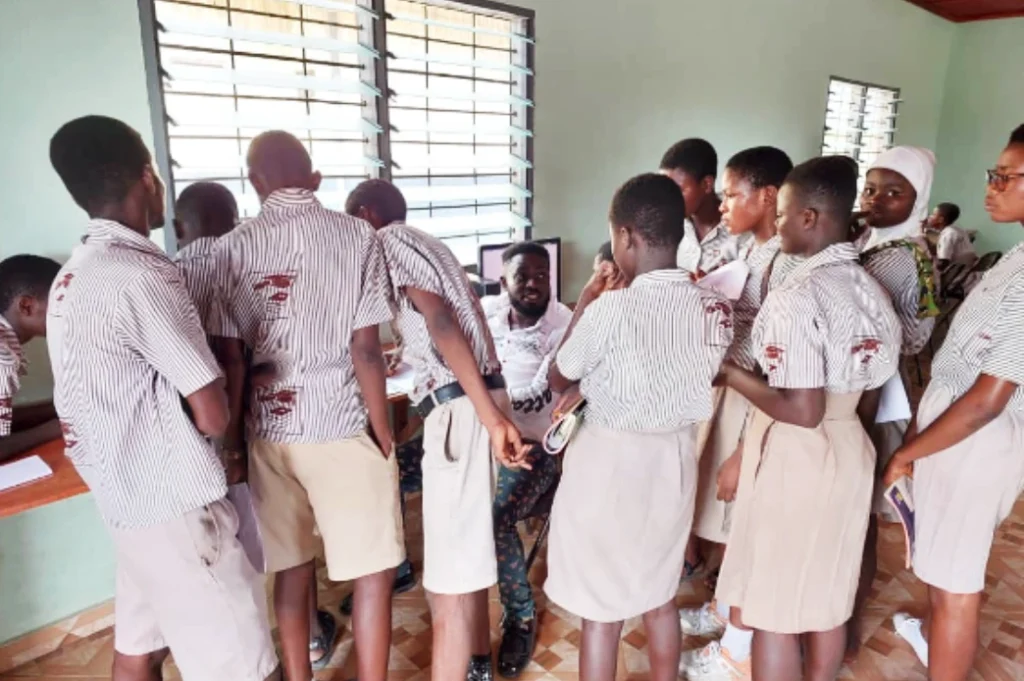Teacher Professional Development at Essuekyir Opanyin Kweku Dadzie Library: Ghana Case Study, (Jane Appiah-Okyere, Doctor of Professional Studies student, Syracuse University).
In November 2022, an Internet Backpack was deployed in Essuekyir Opanyin Kweku Dadzie Library in Essuekyir Village, Ghana, during an Information and Communication Technology (ICT) Teacher Professional Development Workshop. Essuekyir is an under-developed farming and fishing rural community located in the rural part of Winneba, with mostly low-income residents and poor living conditions. The community has a population of about 3,500 residents; it lacks electricity and access to potable drinking water.
The workshop consisted of teachers in public and private elementary and junior high schools in Essuekyir Village, who represent a subset of Ghana’s rural teachers who lack electricity and Internet connectivity in their classrooms. There are five schools in the community: one government primary school (classes 1-6), one government junior high school (forms 1-3), and three private basic schools.

Teacher Training Case Study Participants and Research Team (Ghana Pilot)
Over the years, the Government of Ghana has expanded its educational system. In its Education Strategic Plan (ESP) for 2018 to 2030, the Ministry of Education (MoE) developed an academic-focused Theory of Change that outlines inputs needed to create the educational outcomes, to enhance the education system and align the country’s ESP goals with the SDGs (MoE, 2017).[1] As stated in the ESP, a key policy objective for the MoE is to improve the quality of teaching and learning in Science, Technology, Engineering, and Mathematics (STEM) for all levels of education. Given this objective, the MoE seeks to transform Ghana’s education sector to meet the country’s human resources and national development needs and to enhance national accountability and equity in all educational sectors (MoE, 2017). Additionally, the MoE seeks to develop early interest and competencies by inspiring pre-tertiary students to use information and communication technology tools in the country’s education ecosystem and to transform teachers’ professional development through technology-based training. As a result, the demand for the integration of information and communication technology utilized by instructors has expanded over time.
The teacher professional development workshop was conducted in a library to create an environment that facilitates the formation of social and collaborative groups. Teachers from both public and private schools convened as a group of professional educators and learners. By creating such an environment in a rural community library and providing computers and Internet access through the use of the Internet Backpack, the library’s services and resources can benefit educators, students, and the entire community. Overall, thirty-four teachers volunteered to participate in the workshop and agreed to participate in a WhatsApp group to facilitate communication for additional workshops. On the second day of the workshop, a teacher brought his students to the library to utilize the supplied resources. This demonstrates the importance of ICT tools and the Internet in particular for educational purposes in rural communities, as the ability to instruct students on practical aspects of ICT was previously lacking.

Students Using Resources at the Library (Ghana Pilot)
During the workshop’s hands-on session, participants connected to the Internet using the Internet Backpack, to investigate methods for searching and locating information and resources, as well as techniques for integrating those resources into teaching and learning. Approximately 40 devices were concurrently connected during the hands-on session. After the workshops, teachers from both public and private schools who teach elementary and junior high school students began to use the library for ICT lessons and Internet research tutorials. Their visits to the library began immediately after the workshops, as the teachers, and especially ICT teachers, were highly motivated to introduce their students to the library’s new digital resources. Teachers now bring approximately 25 students per visit to the library. The material has been utilized for both practical tutorials and tests in ICT. Teachers are improving methods of instruction and providing students with practical tools, to build on theoretical lessons learned. This pilot study to equip teachers in rural areas with ICT skills aligns with the goals of the Ghanaian Ministry of Education, which aims to improve the quality of teaching and learning at all levels of education.

Students Using Resources at the Library (Ghana Pilot)

